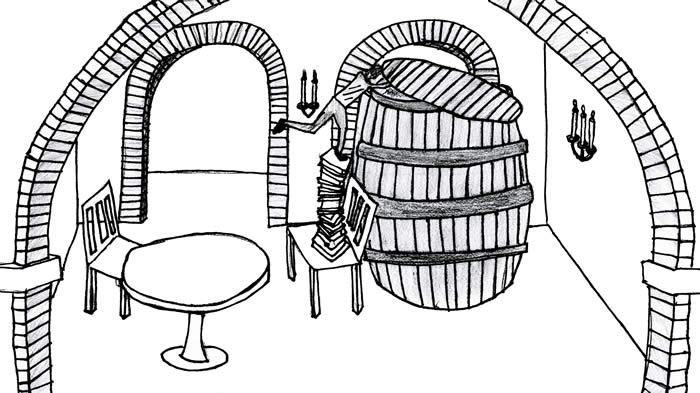

2014/2015
Too Much Lekvarc. 1939; Pelisor, Satu Mare County, Romania Sometimes you can have too much of your very favorite thing. To illustrate this, my mother told me a story that her grandmother told her. My great-grandmother Leah Perl lived in the town Pelisor,* on the border of Hungary and Romania. She was the oldest, and she had many little brothers and sisters. The biggest troublemakers were her youngest brothers, Yitzchak and Mechel. During autumn everyone would harvest plums. Everyone could eat as many plums as they wished — but in 1939 there were oodles of leftovers. People had to figure out what to do with them. Even Leah’s large family could not eat them all. What could they do with a million extra plums? Leah’s mother made a giant pot of lekvar, traditional Hungarian preserves. But one pot wasn’t enough. She would cook endless pots of plums with sugar and lemon peel. Once the lekvar was cooled, she would pour it into a humongous wooden barrel in their basement, where it would be stored for winter. Yitzchak and Mechel, who were only five and six years old, begged to taste the lekvar — they were extremely fond of lekvar. They were not allowed. And Leah, who loved them dearly, refused to help them. It wasn’t right. Day after day, they tried and failed. Their plans grew more and more complex, but they remained empty-handed. Until one day . . . Leah was at school, and her mother was outside working on their farm. The boys’ cheder** let them out early. They were alone, with the barrel in full view. They hatched half a plan—and they didn’t really think it through.
Frantic, Yitzchak cleaned up the splatter and put the top of the barrel back on just as his mother walked through the door. He greeted his mother but didn’t say a word about Mechel. Don’t feel bad for Mechel — there was enough lekvar in the barrel to feed even his bottomless need for lekvar. But as time passed, everyone wondered where he was. Yitzchak kept avoiding the question. His family looked everywhere, but Mechel was nowhere. At sunset it was dinnertime, and Mechel was still missing. Everyone knew that you cannot ever be late for dinner. Everyone panicked, and they asked Yitzchak again. Seeing the fear in their eyes, Yitzchak blurted out the truth. Mechel was rescued. He required hours of bathing (which he hated) to get clean. And then there was the punishment. And his poor stomach hurt for days. I asked my mother whether the boys still liked lekvar after that day. My mother only remembers that when she visited them in Israel when they were old, they offered her lekvar with her bread. Abigail G. Harris; New York, USA Illustrator: Kate Pogue; Missouri, USA
* Today Pelisor is called Lazuri ** A cheder (KHAY der) is a school for Jewish children in which the Hebrew language and religious knowledge are taught.
This copyrighted story and illustration may be copied for limited classroom use or reprinted in an article about The Grannie Annie.
Return to Vol. 10 Stories page
|
Built by Hen's Teeth Network
 Yitzchak pushed a chair to the barrel. Mechel climbed onto the chair to steal enough lekvar for them both. Mechel leaned over the barrel — and what do you know — he fell right in! Lekvar is slimy and sticky, and Mechel was covered from head to toe like a lekvar monster. And their mother was about to come through the door.
Yitzchak pushed a chair to the barrel. Mechel climbed onto the chair to steal enough lekvar for them both. Mechel leaned over the barrel — and what do you know — he fell right in! Lekvar is slimy and sticky, and Mechel was covered from head to toe like a lekvar monster. And their mother was about to come through the door.